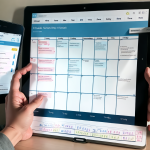Academic stress and academic performance
Facing academic challenges is a norm in university life, yet managing stress and enhancing performance need not be daunting. This guide offers seven effective strategies, rooted in time management, nutrition, and mindfulness, to help students navigate academic pressures. By adopting these practices, students can achieve a balanced academic experience, improving their cognitive functions and maintaining overall well-being, all while staying connected with resources like University Health FCU for additional support.

Understanding Your Stress: The First Step to mental health nursing
In an academic environment, stress may originate from a variety of sources as it is the body’s response to demands or threats. These can include the strain of tests and homework as well as the difficulties of striking a balance between personal and academic obligations. The American Psychological Association emphasizes how crucial it is to recognize these stresses to have a better understanding of how they impact your physical and mental health.
Try thinking about these introspective questions designed especially for students to have a better understanding of your stress triggers:
- What tasks make you feel stressed?
- Do friends or group projects make you more stressed?
- Is your drive to succeed causing stress?
- Does your study space help or hinder you?
- What do you do to relax?
You may start to chart the terrain of your stress by asking yourself these questions. Stress inventory surveys are available from reliable medical sites like Harvard Health and the Mayo Clinic, which can help with this self-evaluation process even more. With the use of these tools, you will be able to identify patterns in your stress reaction and implement a more focused management strategy.
This first stage is admitting that feeling overwhelmed is a common part of being a student as well as figuring out what stresses you out. It serves as the foundation for developing resilience, giving you a clear and purposeful starting point from which to investigate efficient stress management techniques. Having a better understanding of your stress may help you better manage your academic obstacles and create a more balanced, healthy attitude to your time at university.

Time management skills: An opportunity to reduce university stress
A key component of stress reduction and academic performance is efficient time management. It is more than just adhering to a schedule; it also entails prioritizing work, establishing reasonable objectives, and giving oneself time off to rest. For a lot of students, the difficulty lies not only in the amount of work but also in organizing it in a way that fits their academic and personal objectives and seems doable.
Sort your jobs according to priority and urgency first. By grouping jobs into four categories—urgent and essential, important but not urgent, urgent but not important, and neither urgent nor important—techniques like the Eisenhower Box can assist you in choosing and prioritizing your chores. By utilizing this technique, less time is spent on less important tasks and more time is spent on what counts.
It’s crucial to plan your studies so that you take frequent breaks. For example, the Pomodoro Technique recommends 25 minutes of concentrated work, followed by a 5-minute rest. This aids in avoiding burnout in addition to helping to sustain focus. It is equally vital to arrange hobbies and leisure activities since they are great ways to decompress.
Incorporating digital tools and apps for time management can also be beneficial. Apps like Trello, Todoist, or Google Calendar can help you keep track of deadlines, assignments, and meetings, making it easier to see your available time and how best to use it.
Remember, effective time management is not about packing every moment with work; it’s about working smarter. It allows you to create a balanced schedule that includes time for study, rest, and activities that you enjoy, leading to a healthier, more productive academic life.

Establishing a Healthy Lifestyle: Nutrition, Exercise, and Sleep
A healthy lifestyle is a powerful tool for managing academic stress and enhancing performance. Nutrition, exercise, and sleep are the three pillars that support both mental and physical health, directly impacting your ability to cope with stress and concentrate on your studies.
Nutrition plays a critical role in brain function and mood regulation. Eating a well-balanced diet full of whole grains, lean meats, and fruits and vegetables can supply the nutrients and energy needed for optimal cognitive function. Omega-3 fatty acids are very good for the brain and may be found in walnuts, flaxseeds, and seafood. Keeping sugar and caffeine intake under control or completely avoided can also aid in regulating mood and energy levels all day.
Exercise is a proven stress reliever that improves both mental health and cognitive function. The body’s natural mood enhancers, endorphins, are released when you exercise and can help lessen depressive and anxious symptoms. Frequent exercise may boost energy levels, enhance the quality of your sleep, and help you stay composed and focused under pressure. Examples of this include yoga, team sports, jogging, and brisk walks.
Sleep is essential for learning, memory, and emotional regulation. Sleep deprivation may make stress worse, make it harder to concentrate, and affect academic achievement. Setting up a consistent sleep routine is crucial, with 7-9 hours of good sleep each night being the goal. Your sleep quality can be significantly enhanced by establishing a nightly regimen that involves unplugging from electronics for thirty minutes before bed. Your body will respond more favorably to signals to slumber if your bedroom is calm, dark, and cold.
Read also: Finding the Right Medicine
Mindfulness and Relaxation Techniques: Your Mental Health Armor
In the face of academic pressures, mindfulness and relaxation techniques can be your mental health armor, helping you maintain focus and equanimity. These practices teach you to stay present and engaged, reducing the tendency to ruminate on past events or worry about future outcomes.
Mindfulness involves paying attention to the present moment without judgment. Techniques like body scanning, mindful breathing, and mindfulness meditation can help lower stress, sharpen focus, and strengthen emotional control. You may include mindfulness into your everyday routine by engaging in even basic tasks like mindful walking or eating, which can provide a respite from the pressures of studying and deadlines.
Relaxation techniques such as deep breathing, progressive muscle relaxation, and guided imagery are effective tools for reducing stress and anxiety. Anywhere, at any time, one may practice deep breathing techniques to ease stress and promote mental calmness. To promote both physical and emotional relaxation, progressive muscle relaxation entails tensing and releasing various bodily muscle groups. Using guided imagery to picture a calm environment or scene might help you mentally decompress.
By implementing these techniques into your daily routine, you may improve your resistance to stress in the future in addition to managing stress now. You may enhance your mental clarity, emotional stability, and general well-being, which will improve your academic performance and quality of life, by setting aside a small amount of time each day for mindfulness or relaxation.

Essential Vitamins for Enhancing Student Productivity
Vitamin B Complex: The B vitamins are essential for healthy brain function, particularly B6, B9 (folate), and B12. They contribute to the synthesis of neurotransmitters, which are molecules that travel throughout the brain to send impulses. Sufficient intake of B vitamins helps lessen weariness and enhance memory, which makes it easier to focus on lengthy assignments or study sessions.
Vitamin D: Vitamin D, sometimes referred to as the “sunshine vitamin,” has been connected to mood control and cognitive performance. The risk of cognitive impairment has been linked to low levels of vitamin D. The best way to get vitamin D is from sunshine exposure, although supplements can sometimes be helpful, particularly in places with little sunlight.
Vitamin E: This potent antioxidant aids in shielding brain tissue from free radical-induced oxidative damage. Reduced brain function and cognitive deterioration are associated with oxidative stress. Nuts, seeds, and green leafy vegetables are good sources of vitamin E, which promotes brain health generally and supports cognitive function.
Vitamin C: Vitamin C, well-known for strengthening the immune system, is also important for antioxidant defense and cognitive function. It can lessen mental exhaustion and enhance focus, both of which are essential for sustaining productivity during challenging academic times.
Consuming foods high in these vitamins or taking supplements can also greatly improve mental health and, therefore, academic performance. Before beginning any supplement program, you should speak with a healthcare professional, especially if you have any underlying medical concerns or are already taking any other prescriptions.
Read also: Quality Health Care for Students in the USA























